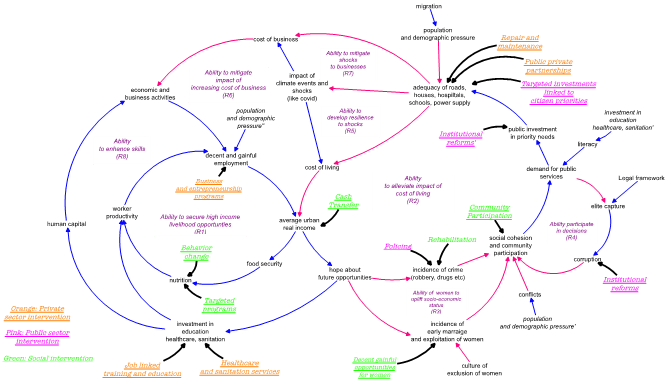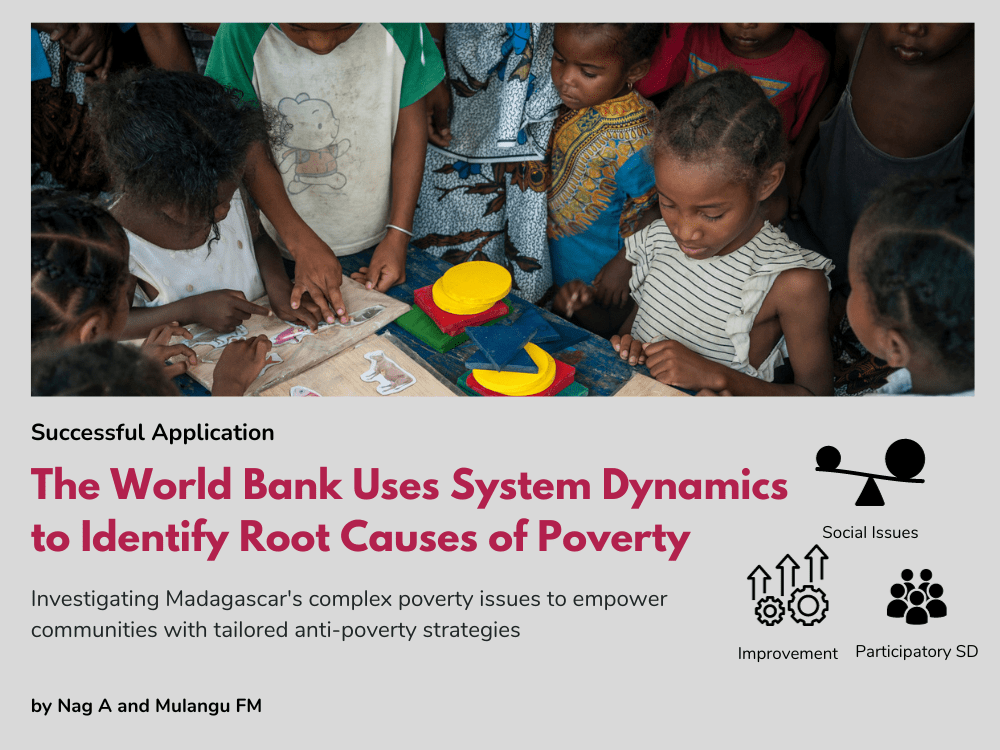The World Bank Uses System Dynamics to Identify Root Causes of Poverty
EXECUTIVE Summary
-
Madagascar has one of the highest poverty rates in the world. In 2022, an astonishingly three out of every four people in Madagascar lived below the poverty line.
-
Poverty has proven to be particularly resistant to previous policy interventions. Hence, the World Bank decided to turn toward system dynamics to identify the systemic causes of the problem.
-
Working with focus groups across the country, this project developed a causal loop diagram that clearly illustrated vicious cycles that stakeholders see as direct contributors to poverty. It allowed stakeholders to identify potential leverage points to develop anti-poverty programs in Madagascar.
#WorldBank #Poverty #Madagascar
The Problem
Poverty in Madagascar has remained persistently high and somehow complex, despite many attempts to reduce it through anti-poverty policies and interventions. As shown in the Macro Poverty Oulook, the share of the population living in poverty (US$2.15 in 2017 PPP) was 81.7% in 2020, 81% in 2021 and 80.6% in 2022.
One of the reasons why past anti-poverty policies have had less than desired success in reducing poverty is the limited understanding of its determinants. Empirical investigations of the determinants of poverty often use linear specifications that regress objective measures of poverty such as income or consumption against observable indicators theoretically justified to explain poverty.
To uncover the root-causes this analysis used a systems thinking approach to characterize a high-level, dynamic, and multi-dimensional view of the poverty trap with Causal Loop Diagrams (CLD) generated from focus group discussions in 6 provinces across the country.
The Solution
The World Bank organized a series of focus groups across a variety of diverse communities within judiciously selected communes in Madagascar. The aim was to identify, understand, and address the unique poverty challenges they face, and to enrich these findings with qualitative data. These focus groups were intentionally structured to spark discussions about the primary obstacles encountered by the communes. Insights from participants across different ages and genders were used to deconstruct these challenges into several root causes. Each root cause was further distilled into simpler, more comprehensible sub-causes.
The causes and their corresponding sub-causes were reanalyzed after deconstructing the poverty issues faced by each commune. This allowed for diligently examining the intricate interconnections that define these challenges. Special emphasis was given to understanding the interactions among various sub-causes and the overall impact on the system. Specifically, we identified reinforcing patterns or loops that sustain poverty and negate efforts by both individuals and policy interventions to alleviate it. In the end, insights shed light not only into the economic determinants of poverty but also the cultural, political, and behavioral intricacies across different demographics, including gender, age, occupation, and community type (rural/urban).
Analyzing poverty by amplifying the voices of the impoverished and evaluating qualitative data was influenced by a seminal World Bank book titled “Voices of the Poor: Crying out for Change.” This report harnessed focus groups across 23 countries to relay the experiences of the impoverished in their own words. In doing so, it underscored significant multidimensional aspects of well-being that had not been previously explored in conventional poverty analyses.
In addition to highlighting the voices of the impoverished and the crucial subtleties pertaining to their circumstances, this project incorporated systems thinking tools. This innovative approach enabled us to evaluate the qualitative data from the focus groups and discern the pivotal narratives and relationships explaining the perpetual cycle of poverty experienced by many households.

The Causal Loop Diagram is a partial representation of the multi-dimensional poverty trap from the perspective of urban households. The CLD identifies eight feedback loops representing the urban poverty trap that inhibits the group’s ability to:
-
secure high income livelihood opportunities (R1)
-
alleviate impact of cost of living (R2)
-
uplift socio-economic status (R3)
-
participate in decisions (R4)
-
develop resilience to shocks (R5)
-
mitigate increasing cost of business (R6)
-
mitigate shocks to business (R7)
-
enhance skills (R8)
Outcomes
Clearly addressing one or few sub-causes will not generate an overall change required in poverty trap situation. The systems thinking exercise proposes a portfolio of upstream and downstream entry points and pathways to improve the ability of communities to move out of poverty over time. This will inform design of projects by the World Bank to activate the identified entry points.
In particular, the project resulted on a list of potential interventions that are directly linked to the feedback loops driving the system. For example, one of the potential interventions could be to promote business and entrepreneurship. Stakeholders in the focus groups thought that training, mentoring, infrastructure, and financing support could help circumvent the current low levels of business and economic activities (R1), and to diversify employment opportunities (R8).
Do you want to know more?
Connect with Amitaksha Nag, Francis Muamba Mulangu
OTHER SUCCESSFUL APPLICATIONS
Solving Bottlenecks in Dairy Production Facilities with System Dynamics
Solving Bottlenecks in Dairy Production Facilities with System Dynamics EXECUTIVE Summary FrieslandCampina faced potential bottlenecks in production due to the merging of two factories. They hired SD&Co which employed system dynamics simulation models to predict...
A Design Value Calculator: A System Dynamics Boardgame
A Design Value Calculator: A System Dynamics Boardgame EXECUTIVE Summary Product design is a specific form of complex innovation that touches all areas of an organization’s management. While entrepreneurs recognise the value of design, they often tend to focus...
Fast-Track Cities Uses System Dynamics to Enhance HIV Care
Fast-Track Cities Uses System Dynamics to Enhance HIV Care EXECUTIVE Summary Low levels of viral suppression at 69% for people with HIV make it hard to believe the 95% target level will be achieved by 2030 in St. Louis, USA. As a solution, Fast-Track Cities-STL opted...
Upcoming Events
Health Policy SIG Networking and Collaboration Event
Please join us for our quarterly Health Policy SIG virtual social hour! Agenda: TBD
Recent Posts
Society Governance Updates
Society Governance Updates Welcome, Allyson! New President Allyson Beall King joined the Policy Council as our 2024 President. Her primary role is as director of the Washington State University School of the Environment, which focuses on regional ecologies and our...
Call for Presenters: Seminar Series
Call for Presenters: Seminar Series We at the System Dynamics Society are continually seeking vibrant and knowledgeable presenters for our ongoing Seminar Series. As we unfold the calendar, there’s always a place for more insights, experiences, and expertise to enrich...
Honoring Excellence: A Glimpse into the Awards of the International System Dynamics Conference
Honoring Excellence: A Glimpse into the Awards of the International System Dynamics Conference The International System Dynamics Conference brings together experts, practitioners, and students to exchange ideas, showcase real-world applications, and celebrate...
Join us
OTHER SUCCESSFUL APPLICATIONS
Solving Bottlenecks in Dairy Production Facilities with System Dynamics
Solving Bottlenecks in Dairy Production Facilities with System Dynamics EXECUTIVE Summary FrieslandCampina faced potential bottlenecks in production due to the merging of two factories. They hired SD&Co which employed system dynamics simulation models to predict...
A Design Value Calculator: A System Dynamics Boardgame
A Design Value Calculator: A System Dynamics Boardgame EXECUTIVE Summary Product design is a specific form of complex innovation that touches all areas of an organization’s management. While entrepreneurs recognise the value of design, they often tend to focus...
Fast-Track Cities Uses System Dynamics to Enhance HIV Care
Fast-Track Cities Uses System Dynamics to Enhance HIV Care EXECUTIVE Summary Low levels of viral suppression at 69% for people with HIV make it hard to believe the 95% target level will be achieved by 2030 in St. Louis, USA. As a solution, Fast-Track Cities-STL opted...
Recent Posts
Society Governance Updates
Society Governance Updates Welcome, Allyson! New President Allyson Beall King joined the Policy Council as our 2024 President. Her primary role is as director of the Washington State University School of the Environment, which focuses on regional ecologies and our...
Call for Presenters: Seminar Series
Call for Presenters: Seminar Series We at the System Dynamics Society are continually seeking vibrant and knowledgeable presenters for our ongoing Seminar Series. As we unfold the calendar, there’s always a place for more insights, experiences, and expertise to enrich...
Honoring Excellence: A Glimpse into the Awards of the International System Dynamics Conference
Honoring Excellence: A Glimpse into the Awards of the International System Dynamics Conference The International System Dynamics Conference brings together experts, practitioners, and students to exchange ideas, showcase real-world applications, and celebrate...
Upcoming Events
Health Policy SIG Networking and Collaboration Event
Please join us for our quarterly Health Policy SIG virtual social hour! Agenda: TBD


